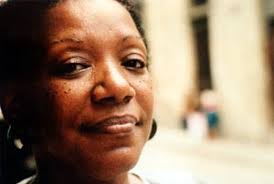
Nancy Morejón is the best known and most widely translated woman poet of post-revolutionary Cuba.
Born in 1944 in Havana to a militant dock worker and a trade-unionist seamstress, Morejón graduated from Havana University, where she majored in French, and became the first black woman poet to publish widely and be accepted as a professional writer, critic, and translator.
Morejón has received the Critic’s Prize (1986) and Cuba’s National Award for Literature (2001). She has collaborated with prominent musicians, playwrights, and actors, and extended her artistic talents into the visual arts. She directs the Caribbean Studies Centre at Casa de las Américas, Havana.
Morejón’s work addresses contemporary issues of ethnicity, gender, history, politics, and Afro-Cuban identity. Her poems stand as vibrant reflections on the mix of Spanish and African cultures in Cuba, what it means to be a child of both traditions, and how the bright threads of this heritage are part of the greater web of the African experience in the Americas.

Like her mentor the legendary poet Nicolás Guillén, Morejón celebrates blackness but refuses to inscribe identity or struggle within the parameters of any single factor. “I am, firstly, Nancy Morejon,” she says, “an individual, a unity, who cannot be subdivided into parts as one does when learning math…I am not more of a black person than a woman; I am not more of a woman than a Cuban; I am not more of a black person than a Cuban. I am a brief combustion of those factors.”
Watch this interview from 2018 of Nancy Morejon by Telesur (23mins) about her life and her work
Watch this 9 mins documentary about her work by director Juanamaria Cordones-Cooke, including a reading of her most famous poem ‘Black Woman by the poet herself.
Two of Morejon’s most famous poems are ‘Mujer Negra’ (‘Black Woman)’ and ‘Amo a mi amo‘ (‘I love my master’). About these 2 poems Morejon has said:
“The first poem is almost the emblem of a history of displacement forged in this case by the condition of race. It is the epic vision of that displacement which was the forced transplant of millions of African slaves to American lands. I wrote it in a dreamlike state. Its wide distribution and success do not inhibit me from saying that I wrote it in a spontaneous manner with no forethought. When this poem was useful for anti-racism movements, to elevate racial awareness, I felt satisfaction and joy. While writing the poem, I never thought it would have the reach it has nowadays.
The second poem is a recompense for the first. They are very connected to each other. Where the first takes an epic perspective, the second is marked by an introspective mood. The first has an “I” who is a we. In the second, that “I” shows its race as an important category that is clearly conditioned by its physical and moral existence as subjected to a system of slavery. I wanted to paint the psychic disorders that slavery has left in every society that it marked. Our literatures spoke of its horrors more in global terms, in external aspects. I wanted to sketch a feminine psychology that suffered the depredation of the body to the same significant degree as that of its inner world, which was weighed down in turn by the insurmountable condition of its physical and moral being. That is why she resorts to a supreme act of violence such as murder.
“Mujer negra” and “Amo a mi Amo” are two sides of the same coin.”
Extracted from interview with Nancy Morejon in 2002 in Bomb magazine here
Mujer Negra / Black Woman
I still smell the foam of the sea they made me cross.
The night, I can not remember it.
The ocean itself could not remember that.
But I can’t forget the first gull I made out in the distance.
High, the clouds, like innocent eyewitnesses.
Perhaps I haven’t forgotten my lost coast,
nor my ancestral language.
They left me here and here I’ve lived.
And, because I worked like an animal,
here I came to be born.
How many Mandinga epics did I look to for strength.
I rebelled.
His Worship bought me in a public square.
I embroidered His Worship’s coat and bore him a male child.
My son had no name.
And His Worship died at the hands of an impeccable English lord.
I walked.
This is the land where I suffered
mouth-in-the-dust and the lash.
I rode the length of all its rivers.
Under its sun I planted seeds, brought in the crops,
but never ate those harvests.
A slave barracks was my house,
built with stones that I hauled myself.
While I sang to the pure beat of native birds.
I rose up.
In this same land I touched the fresh blood
and decayed bones of many others,
brought to this land or not, the same as I.
I no longer dreamt of the road to Guinea.
Was it to Guinea? Benin?
To Madagascar? Or Cape Verde?
I worked on and on.
I strengthened the foundations of my milllenary song and of my hope.
I left for the hills.
My real independence was the free slave fort
and I rode with the troops of Maceo.
Only a century later, together with my descendents,
from a blue mountain
I came down from the Sierra
to put an end to capital and ursurer,
to generals and to bourgeoisie.
Now I exist: only today do we own, do we create.
Nothing is foreign to us.
The land is ours.
Ours the sea and sky,
the magic and vision.
Compañeros, here I see you dance
around the tree we are planting for communism.
Its prodigal wood resounds.
Translated by Kathleen Weaver. English & original Spanish here
I Love My Master
I love my master.
I gather firewood to light his daily fire.
I love his clear eyes.
Tame as any lamb,
I scatter drops of honey on his ears.
I love his hands
which laid me down on a bed of grass:
My master bites, subjugates.
He tells me secret stories while
I fan his whole body, full of sores and bullet wounds,
of days in the sun and plunderous war.
I love his feet, which buccaneered and wandered round
in foreign lands.
I massage them with the finest powders,
which I found one morning
while leaving the tobacco field.
He strummed his guitar and from his throat came
sonorous verses, as if born from the throat of Manrique.
I wished I had heard a marímbula play.
I love his delicate red mouth,
from which spill words
that I cannot quite decipher
yet. My tongue for him is no longer his own.
And the silk of time in tatters.
Hearing the old field guards talking, I learned
that my love
gives lashings in the cauldrons of the sugar mill,
steaming like some Hell, the Hell of that Lord God
he used to talk to me about unendingly.
What could he tell me?
Why am I living in a lodging perfect for a bat?
Why must I serve him?
Where could he go in his splendid carriage,
drawn by horses happier than I?
My love is like the weeds that cover the dowry,
the only possession he cannot take from me.
I curse
this muslin robe he has imposed on me;
these vain lace dresses he forced on me without pity;
these chores of mine in the sunflowerless afternoon;
this baroquely hostile tongue I can’t get between my teeth;
these stone breasts that can’t even suckle him;
this womb, raked by his immemorial lashings;
this accursed heart.
I love my master, but every night
when I cross the flowery pathway to the cane fields
where we have surreptitiously made love,
I can see myself with knife in hand, butchering him like
innocent cattle.
Deafening drumbeats no longer let me
hear neither his sorrows, nor his complaints.
The tolling bells call me.
(Translated by David Frye)
From LOOKING WITHIN / MIRAR ADENTRO (Wayne State University Press, 2003
 Listen to Cuban poet Nancy Morejon discuss AfroCuban culture and the contribution to US culture
Listen to Cuban poet Nancy Morejon discuss AfroCuban culture and the contribution to US culture
It’s a half hour recording and she reads some of her poetry towards the end of the show.
She is pretty magnificent as she educates the interviewer on artist Wifredo Lam, musicians Chucho Valdes, Chano Pozo, Omara Portuondo and many other Cubans who have played key parts in the formation of culture in the US, let alone Cuba.

1 thoughts
Comments are closed.